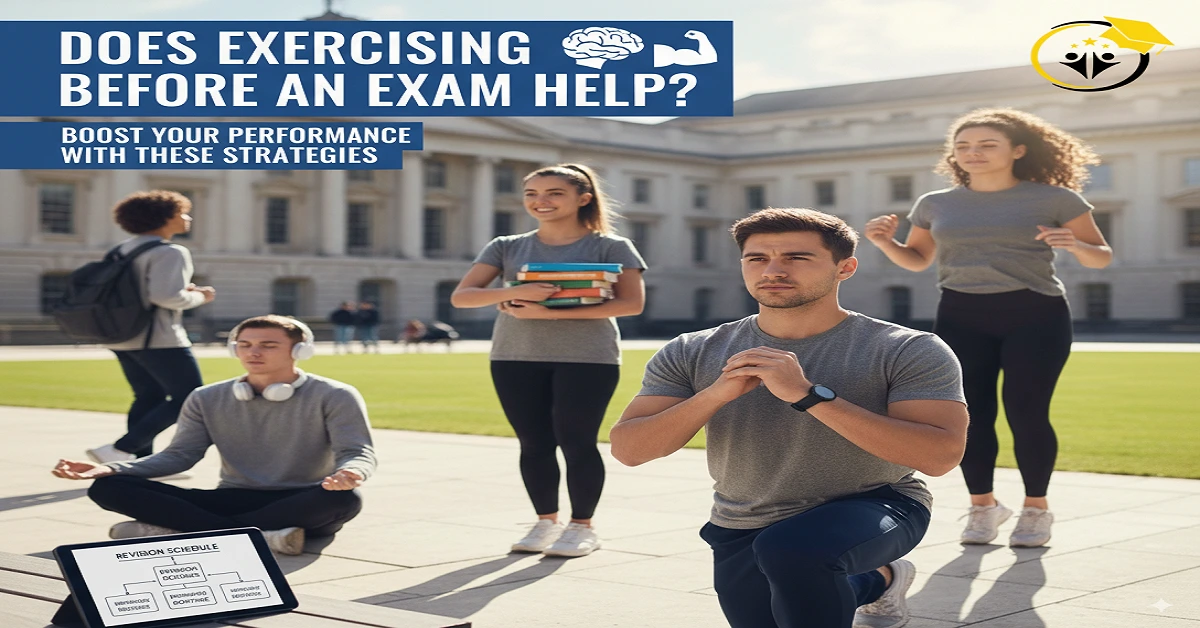Does Exercising Before an Exam Help? Boost Your Performance with These Strategies
Introduction
Is it helpful to exercise prior to an exam? A question that most students ask themselves often is related to exam preparation and the pressures and stress that come with it. Studies indicate physical activity prior to an exam to be beneficial in reducing stress, enhancing cognitive ability, and increasing memory levels. Understanding how to reduce stress during exams might be the key to improving your performance and make sure that you are in the right state of mind. o, it is time to get into the reasons why exercise is a good solution when you are stressed about an exam and how exercise can make you more focused and clear.
How Does Exercising Before an Exam Help?
There are a number of cognitive and emotional benefits that exercise in the presence of an exam offers. The following is how exercising helps, particularly when you are stressed about an exam:
- Improves Blood Flow to the Brain:
- Exercise improves blood flow and delivers more oxygen to the brain, and this can enhance brain performance.
- This increased blood flow keeps the brain alert. Exercise can be one of the best options in case you are wondering “What to do when stressed about a test.”
- Reduces Stress and Anxiety:
- Exercise also leads to the release of endorphins, which reduce anxiety and elevate mood. It is normal to get nervous prior to an exam “Why am I so stressed about my exam? could be in your mind, however that stress can be relieved by physical activity.
- Exercise can be a natural method of calming your nerves and getting prepared mentally when you are stressed about an exam.
- Improves Mental Clarity and Focus:
- Exercise encourages the synthesis of neurotransmitters such as dopamine and serotonin that are critical to concentration and motivation.
- In case you are finding it hard to focus or you are feeling disorganized, an exercise can make you feel more mentally ready to study and pass the exam.
- Boosts Memory Retention:
- Exercise is also capable of activating parts of the brain that deal with storing information like the hippocampus that would boost your memory to remember your exam.
- When you are wondering how to enhance recall during your exam, exercise may be an excellent option that can be used to enhance memory.
What Type of Exercise is Best Before an Exam?

When you are pondering what to do when you are stressed about a test, exercising might be the solution but you have to make sure that it is the appropriate form of exercise. The following is a description of the most optimal forms of exercise:
- Moderate Aerobic Exercises:
- Examples: Brisk walking, jogging, cycling, or swimming.
- These exercises improve blood flow, helping you feel energized and clear-headed.
- If you’re struggling with stressed about exams, moderate aerobic exercise can be an excellent way to get into a more relaxed and focused state.
- Yoga and Stretching:
- Examples: Gentle yoga, stretching, or deep breathing exercises.
- Yoga is particularly helpful if you’re feeling tense or anxious. What to do when stressed about a test? Try yoga to calm both your mind and body.
- Strength Training (Light to Moderate):
- Examples: Bodyweight exercises like push-ups or squats.
- Such exercises are excellent to grow energy and decrease the level of stress. When you are stressed on an exam, light strength training is an easy and effective mode of mood elevation.
- High-Intensity Interval Training (HIIT):
- When to Avoid: Do not exercise hard immediately before an exam. HIIT is also a good exercise that improves general fitness, but it may lead to fatigue and impaired focus and memory. You do not want to be mentally exhausted, when you have a test to pass.
Does Exercise Improve Memory Retention for Exams?

When you have been wondering What to say to someone who is stressed about an exam, then one of the best things to say could be the encouragement of exercise. Exercise has been observed to enhance memory retention in several aspects:
- Increases Brain-Derived Neurotrophic Factor (BDNF):
- BDNF supports brain function and helps create new neural pathways, which are essential for memory retention.
- Exercise can also enhance your memory especially when you need to study or write exams, by increasing the BDNF. Exercising regularly can make sure you never find yourself asking yourself the question why am I so stressed about my exam? since it enhances mental clarity and concentration.
- Stimulates the Hippocampus:
- The hippocampus is an important part of memory storage and recall. Exercise has also been found to enhance the activity of this part of the brain that results in enhanced memory retention.
- An exercised brain will be better positioned to process and recall facts that can help you get better results in your examination.
- Supports Brain Plasticity:
- Plasticity in the brain enables the brain to change and create new connections as a result of new information.
- Workout enhances neuroplasticity which improves your capacity to learn and memorize new information. In case you are having problems with exam preparation, exercise may assist in enhancing cognitive flexibility and memory retention.
Exercise and Stress Reduction Before an Exam

In case you are asking how to help someone stressed about exams, suggesting regular exercise might be one of the most supportive things you can do. Exercise lowers cortisol, the hormone of stress, and elevates endorphins, which are fundamental in mood elevation. You can assist them in reducing their stress levels by including some light exercise in their pre-exam regimen and enable them to be better prepared to take the test. The following is one way exercise can manage stress before an exam:
- Boosts Endorphin Levels:
- Exercise is a natural way to produce endorphins which are natural body mood boosters.
- When you are wondering what to say to someone who is stressed about an exam, a good and supportive response can be a recommendation of exercise, which can help lessen the overwhelming stress.
- Regulates Cortisol Levels:
- Cortisol is a stress hormone and elevated levels may disrupt the cognitive ability. Exercise aids in lowering cortisol and gets your mind relaxed before exam.
- Exercise has also been associated with the better management of stress at a long-term. Exercise may reduce the base stress levels of those who are stressed about exams in the long-run.
- Improves Sleep Quality:
- Working out enhances sleep, which is essential to memory consolidation and exams.
- When you are stressed about an exam and cannot sleep, regular exercise can make you sleep better, think more clearly and remember better when you have an exam.
- Clears the Mind:
- Exercise may also be used to clear your head and recharge your emotions.
- When you are feeling overwhelmed with your studying or are facing an exam, exercise is a fantastic way to have a mental break and to get back to your work with refreshed energy and focus.
Should You Exercise Before or After Studying?

You are preparing to take an exam and may be asking yourself whether to work out before or after you study to maximize your focus. The advantages of working out at various times are as follows:
Exercise Before Studying:
- Benefits:
- Working out will help make you feel more active and awake and focus on your study material easier.
- Moderate exercise will aid in activating your brain and enhancing memory that helps you to avoid the stress that comes with struggling to focus because of exhaustion, when you are fatigued.
- When you have an exam to do, a pre-exam exercise will clear your mind and give you a mental boost.
Exercise After Studying:
- Benefits:
- Post-study exercise is a great way to relieve stress and have fun.
- Exercise also clears your head and you can shift to relaxation instead of studying.
- When you have a stressful study session, exercise may help you rewind and alleviate the anxiety you may feel when you have exams.
The Impact of Exercise on Exam Day
On exam day, it’s essential to use exercise to your advantage. Here’s how to incorporate physical activity into your routine without overdoing it:
- Light Exercise in the Morning:
- Just a morning workout that is short and light can energize you and any anxiety before an exam. When you are under the pressure of exams, a morning workout is likely to make you feel calmer and ready to take the test.
- Avoid Intense Exercise Right Before the Exam:
- Do not use demanding exercises that might make you tired or add avoidable stress. You do not want to feel tired or drained but awake and alert.
- Stretching or walking are also okay, but do not overwork yourself until the exam.
What Not to Do Before an Exam
To ensure you’re fully prepared and at your best, there are a few activities to avoid before an exam:
- Over-Exercise:
- Don’t engage in intense exercise close to the exam, as it can leave you feeling mentally exhausted. If you’re already stressed about an exam, this might add to your anxiety.
- Skipping Sleep:
- Exercise can help improve sleep, but don’t sacrifice rest on the night before the exam. Proper sleep is essential for optimal cognitive function during the test.
- Excessive Caffeine:
- While it might be tempting to rely on caffeine, excessive amounts can increase anxiety, making you feel more stressed about the exam.
Conclusion
In conclusion, studying before an exam can have a huge impact on your performance in terms of better retention, decreased stress, and better cognition. Exercise may also be a helpful activity to help you relax and prepare your body and mind to take exams, particularly when you are stressed about them. A moderate aerobic exercise, yoga, or a light intensity of strength training are the right types of exercise to ensure that the body and mind are ready to write the exam. Stress can be controlled by incorporating a daily exercise routine and this will help you focus well in exams.







